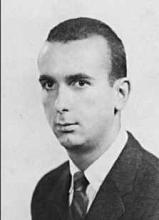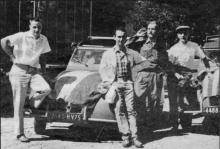 |
YVES TOMMY-MARTIN (1935-1959)
Yves Tommy-Martin came to Amherst in September 1956 as a French language assistant in the Fulbright exchange program. Having studied more than two years at the University of Paris, he was then admitted to the Class of 1958.
A strong student, he majored in English, wrote a magna thesis on Faulkner and was elected to Phi Beta Kappa. He was also more cosmopolitan than most of us. Yves had traveled in England, Germany, Austria, Switzerland, Spain and Tunisia. He was a skier, a swimmer, a horseback rider and a superb cook.
His personal charm was sincere and disarming, yet he was a reflective person who always maintained his own independence. The members of the French department held Tommy-Martin in the highest esteem, and his selection as a member of AD testifies that his fellow undergraduates – who often tended to overlook foreign students – regarded him just as highly.
Following graduation, Yves taught French and Latin in 1958-59 at the American School of Paris. But during that year he was hatching a much larger project. It was his idea to create a grand automobile trip from Paris to Africa, circumvent the continent, and then finish in Paris – the “Tour d’Afrique Franco-Americain.”
He spent the year recruiting corporate sponsors (e.g., Citroen and Michelin provided equipment, Paris Match was granted exclusive rights for the story) and recruiting three other companions. But the idea of the trip was more than adventure. It was to explore a whole new realm of experience. Yves wished to know new people, new ideas and new places. Also, he wished to know a new role for himself, one of “action” as opposed to the role of observer, which he felt as a student.
One early recruit was Lou Eastman, who fortunately backed out at the last minute. Lou looked up Yves in Paris in the fall of 1958. He recalls, “Yves invited me to go on the trip. Quite uncharacteristically (then and now, given my preference for physical comfort), I accepted. Some time in spring 1959 I bought one of the two 2-CV Citroens. In May my dad visited me in Paris. He thought I might want to reconsider going given my distaste for camping (putting it simply). I talked to Yves; he was understanding. He bought the car from me.”
Very well supplied – they carried 40 spare tires – the group of four (John Armstrong ’54 was among them) left Paris on the 4th of July 1959. They first drove to Beirut, then traveled by ship to Port Said. The plan was to drive through Egypt into the Sudan, down to the Cape, then up the West Coast of Africa, to Gibraltar, Spain and back to Paris – by Christmas.
After they left Aswan for the Nubian Desert, the tale became shrouded in mystery. It remains so a half century later. Although they had hired a young boy as a guide for the roadless drive across the “boundless and bare” desert, they apparently became lost and ran out of water. And, according to an article in Time magazine, “ the Nubian boy they hired had never been a guide before in his life.”
The last message, penned by Tommy-Martin in diaries found later, was written in despair in early August. “We are approaching the end. Searched the entire area for water but found none.… We are all in bad shape. Nothing can save us from death except a measure of good fortune – a chance that would give life back to us.”
By early October, when no word had been received since July, a United Arab Republic patrol found the bodies of four victims, including Tommy-Martin, near their vehicles. Yves was 24 years old – the first in the Class of 1958 to die.
The Egyptian authorities were uncooperative from the beginning. The Tommy-Martin family suggested foul play and a possible cover-up, although there were no initial signs of theft or injuries to the bodies. The family employed private detectives to research the case (France then had no diplomatic relations with the U.A.R.). They apparently found evidence that one of the cars had bullet holes in its side.
As late as 1979 Alumni Secretary Al Guest was in touch with Tommy-Martin’s sister, still investigating the case. She had written Guest that an autopsy later conducted on her brother “revealed broken bones.” So no one could say with certainty what happened. The sister told Guest, “Maybe the unknown is better.”
Yves Marc Tommy-Martin died in the Nubian Desert in northern Africa, sometime in August 1959.
 |
| Copy of photo from Time magazine, Nov. 7, 1959, in which the reporter apparently fabricated that Yves’ plan came out of “a college bull session” involving co-victim John Armstrong ’54 and Yves, an impossibility, since Yves came to Amherst two years after Armstrong’s graduation. |